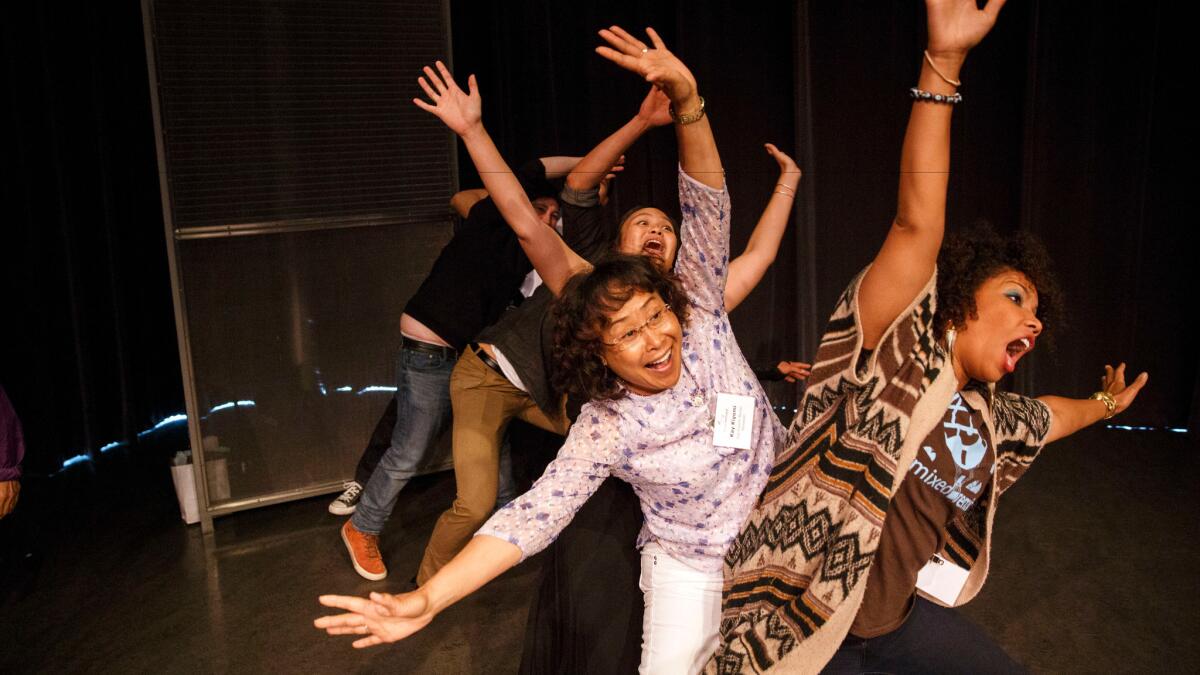Hundreds head to downtown L.A. for nation’s largest gathering for multiracial people

Their eyes shimmered with tears when embracing the “others.”
But this gathering -- the nation’s largest for multiracial people held Friday and Saturday in downtown’s Little Tokyo -- would not be graced with sadness.
“We’re here to celebrate. You look around you, you see not only your identity, but countless identities,” said founder Heidi Durrow of the Mixed Remixed Festival, in its third year, drawing nearly 1,000 participants.
“When someone meets someone like us, they always say, ‘What are you?’ ” Durrow said. “Based on our faces, they form expectations. That’s why we invite them to move beyond images to hear our stories -- then let’s share everyone’s stories.”
So she and organizers staged sessions, helping millennials, other adults and children do just that through books, talks, art, film and live performances.
The lineup attracted actors, comedians, dancers, authors and bloggers from across California -- one of 16 states where the number of multiracial residents has surpassed 200,000 or more, according to the U.S. Census. Plenty of families flew in from the Midwest and the East Coast.
Among them were Kenneth Smith and his daughters, Mariah and Acasha, who planned their summer vacation around the festivities.
The Harpers Ferry, W. Va., siblings took ancestry tests that revealed their African American and European roots. “Our background includes Spanish, Italian, Russian and Finnish. It does confuse outsiders,” said Acasha Smith, an information technology student at Shepherd University near her hometown. “I introduce them to my dad, who is darker-skinned and they question us, ‘Is that your adopted dad?’ ”
‘You don’t get asked that at a festival like this,” said Mariah Smith, a veterinary student at Potomac State College in West Virginia. “I think this is where you can be normal. And though a lot of society hasn’t realized it, multiracial is more and more normal in America.”
Durrow, who lives in West Los Angeles, agreed. She calls herself Afro-Viking because she is African American and Danish. Her parents married in Denmark since it was illegal for them to tie the knot in South Carolina in 1965, when interracial weddings were outlawed.
“We actually thought our mom and dad were outlaws, but in a good way,” Durrow recalled. “The festival emerged from my desire to commune with those around me.… L.A. is obviously diverse, but there’s still no natural space for a natural conversation about our issues.
“Talking race is timely,” she added, alluding to the sometimes racially charged presidential campaign.
Durrow posed next to a poster for “Loving,” the story of Richard and Mildred Loving, an interracial couple who married and spent the next nine years fighting to stay together as a family. They took their civil rights case, Loving v. Virginia, to the Supreme Court, which in 1967 invalidated laws preventing interracial unions.
Festivalgoers streamed toward the movie display to snap pictures at a photo booth, sponsored by Focus Features, which is releasing the film in November. The Lovings’ landmark battle created buzz at the event, where people debated transracial adoptions, use of the word “mulatto” and what to do with naturally curly or straight “biracial” hair.
Via Perkins, who wrote her honors thesis on biracial people at Salem State University in Massachusetts, said that growing up, influenced by her maternal grandparents who are German, Slovakian and English, pushed her to apply for a spot at the festival to showcase her writing and poetry work.
“On my father’s side, I’m also African American,” she said. “Being a person that doesn’t fit into a description, you have to figure out how to evolve. Coming here, I felt a kind of peace and a grounding. Wow.”
Deanna Novak of Orlando, Fla., launched kidsHeritage Inc. to help multiracial kids get a head start. The Italian American married a man who is Polish-Czech and after giving birth to their daughter, she stumbled on the idea of publishing “My Heritage Book.” It’s a personalized children’s book, with up to six countries that mirrors a youngster’s background, allowing them to learn family values and traditions.
“There was nothing that spoke to all of our cultures,” Novak said of her and her husband’s ancestries. “This story shows a child that he or she belongs. You boost their confidence so when they’re older, they can make decisions about the world around them, about politics, religion, lifestyle.”
Carolyn Forbes, mother of three, grandmother of 14 and great-grandmother of 10, happily ordered a volume. She created a website for her extended family, and from her Oregon home in Woodburn, south of Portland, she updates it regularly with all their activities. She has French, English and Scottish roots, and her clan is a blend of Filipino, Native American, Caucasian, Salvadoran, African American, Hawaiian and Mexican heritage.
At 68, she can trace her mother’s lineage to 1370 in Suffolk, England, and says she and husband, Louie Wilson, didn’t expect to find “such a treasure” at the conference. “We just came to meet a Facebook friend.”
But being at Mixed and Remixed tells them that “the future will be less and less distinctive,” added Wilson, 70. “And the more people we have from everywhere, the better we are. I say open the borders.”
Twitter: @newsterrier
ALSO
Pride festival kicks off in West Hollywood
Spate of shootings in L.A. County leaves at least seven dead and five wounded
Hundreds of aftershocks from magnitude 5.2 Borrego Springs earthquake
More to Read
Sign up for Essential California
The most important California stories and recommendations in your inbox every morning.
You may occasionally receive promotional content from the Los Angeles Times.











